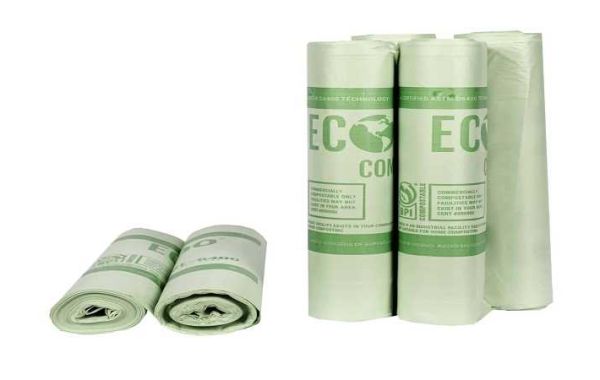Welcome to the world of eco-consciousness, where even our trash can make a positive impact on the environment! If you're someone who wants to do their part in reducing waste and minimizing their carbon footprint, then compostable trash bags are about to become your new best friend. These innovative bags are not only convenient for disposing of organic materials, but they also break down naturally, leaving behind no harmful residues. In this blog post, we'll explore what compostable trash bags are, how they help the environment, their benefits and drawbacks, as well as tips on using them effectively. So grab your green thumbs and let's dive into the wonderful world of compostable trash bags!
What are compostable trash bags?
Compostable trash bags, also known as biodegradable bags, are a sustainable alternative to traditional plastic garbage bags. Unlike regular plastic bags that take hundreds of years to decompose, compostable trash bags are specifically designed to break down naturally within a shorter period of time.
These eco-friendly bags are typically made from plant-based materials such as cornstarch or vegetable oils, making them safe for the environment and suitable for composting along with organic waste. They undergo a process called "aerobic decomposition," meaning they require oxygen-rich environments like compost piles or industrial facilities in order to fully degrade.
One key feature of compostable trash bags is their ability to turn into nutrient-rich soil when properly broken down. This means that not only do they help reduce the amount of waste sent to landfills, but they also contribute positively by enriching the soil with valuable nutrients essential for plant growth.
It's important to note that while these bags may look and feel similar to regular plastic ones, they have distinct differences in terms of their composition and environmental impact. Compostable trash bags meet specific standards set by organizations such as the Biodegradable Products Institute (BPI), ensuring their authenticity and adherence to environmentally friendly practices.
Next time you're taking out the garbage, consider making the switch to compostable trash bags – your contribution towards creating a greener world starts right at home!
How do compostable trash bags help the environment?
Compostable trash bags play a vital role in helping the environment by reducing the amount of waste sent to landfills. When organic waste, such as food scraps and yard trimmings, is disposed of in regular plastic bags, it takes years to break down and releases harmful greenhouse gases into the atmosphere.
On the other hand, compostable trash bags are made from natural materials like cornstarch or plant fibers that can be broken down through composting processes. By using these bags for organic waste disposal, we not only divert this valuable resource from landfills but also contribute to creating nutrient-rich compost that can be used to fertilize gardens or agriculture.
These eco-friendly alternatives help reduce methane emissions produced by decomposing organic matter in landfills – a gas with more than 20 times the global warming potential compared to carbon dioxide.
Moreover, using compostable trash bags reduces our reliance on non-renewable resources like petroleum-based plastics. By opting for sustainable options like these, we lessen our environmental footprint and support a circular economy.
By making small changes in our daily lives -such as switching to compostable trash bags- we contribute towards a greener future where waste becomes a valuable resource rather than an environmental burden.
What are the benefits of using compostable trash bags?
What are the benefits of using compostable trash bags? Let's explore the advantages of incorporating these eco-friendly alternatives into our daily lives.
1. Reduces plastic waste: Traditional plastic trash bags take hundreds of years to decompose, contributing to the ever-growing problem of plastic pollution. Compostable trash bags, on the other hand, are made from plant-based materials that break down naturally and quickly in composting facilities.
2. Supports sustainable practices: By using compostable trash bags, you actively participate in reducing your environmental footprint. These bags are often derived from renewable resources such as cornstarch or vegetable oils, making them a more sustainable choice compared to their petroleum-based counterparts.
3. Enhances soil health: When you dispose of organic waste in a compostable bag and send it for composting, both the bag and its contents can be turned into nutrient-rich soil amendments. This process enriches soil fertility and promotes healthier plants by increasing moisture retention and improving overall soil structure.
4. Minimizes greenhouse gas emissions: Landfills are significant contributors to greenhouse gas emissions due to the decomposition of organic waste without oxygen (anaerobic decay). Composting with compostable bags reduces methane production—a potent greenhouse gas—and helps combat climate change.
5. Promotes responsible consumerism: Choosing compostable options encourages manufacturers to prioritize sustainability over convenience-driven disposable products like traditional plastic garbage bags.
Embracing compostable trash bags is a simple yet impactful step towards living more sustainably and mitigating environmental harm caused by conventional plastics. So why not make this small change today for a greener tomorrow?
Are there any drawbacks to using compostable trash bags?
While compostable trash bags offer numerous benefits for the environment, it's important to consider any potential drawbacks before committing to their use. One possible drawback is the higher cost compared to traditional plastic trash bags. Compostable bags are typically made from plant-based materials which can be more expensive to produce.
Another consideration is that compostable bags require specific conditions in order to break down properly. If they end up in a landfill or incinerator, they may not have sufficient access to oxygen and microbial activity needed for decomposition. This means that even though they are labeled as "compostable," they may not actually break down as intended.
There is also some debate about whether compostable bags truly reduce overall waste and carbon footprint. Critics argue that the energy used in manufacturing these bags offsets any environmental benefits gained from diverting them from landfills.
Furthermore, while compostable bags are designed to be strong and durable, some users find them less sturdy than traditional plastic options. This could potentially lead to leaks or tears if the bag is filled with heavy or sharp objects.
Although compostable trash bags offer eco-conscious individuals an alternative option for waste disposal, there are certain drawbacks worth considering such as their higher cost, specific decomposition requirements, potential lack of overall environmental benefit, and perceived durability issues compared to traditional plastic alternatives.
How to use compostable trash bags
Using compostable trash bags is a simple and effective way to reduce your environmental impact and contribute to a greener future. Here are some tips on how to use them effectively.
First, make sure you choose the right size of compostable trash bag for your needs. They come in various sizes, so consider the amount of waste you typically generate and select accordingly. It's better to have a slightly larger bag than one that's too small and ends up tearing or overflowing.
When filling the compostable trash bag, avoid putting any non-compostable items inside. This includes plastic wrappers, aluminum foil, and other materials that won't break down naturally. Instead, focus on organic waste such as fruit peels, vegetable scraps, coffee grounds, and eggshells.
Once the bag is full or when it's time to empty it, tie it securely at the top to prevent any leakage or odors. Be careful not to overstuff the bag as this can cause it to tear when lifting or transporting.
When disposing of your compostable trash bag, check if your local municipality has specific guidelines for collection or drop-off locations. Some areas may have dedicated composting facilities where these bags can be processed along with other organic waste.
Remember that composting takes time – usually several months – before the contents fully decompose into nutrient-rich soil. So be patient! You'll soon see how your efforts contribute positively towards minimizing landfill waste while nourishing our planet.
By following these simple steps on how to use compostable trash bags correctly, you're making a significant difference in promoting sustainability and reducing greenhouse gas emissions from landfills! Keep up the good work!
Where to find compostable trash bags
Where can you find compostable trash bags? Thankfully, as more people become aware of the importance of sustainable living, these eco-friendly alternatives are becoming increasingly available. You can find them in various places both online and offline.
Online retailers like Amazon, Walmart, and Target offer a wide selection of compostable trash bags. Simply search for "compostable trash bags" on their websites, and you will be presented with numerous options to choose from. Many specialty eco-friendly stores also have an online presence where you can conveniently purchase compostable trash bags.
If you prefer shopping in person, check out local grocery stores that prioritize sustainability. Some supermarkets now have dedicated sections for environmentally friendly products that include compostable trash bags. Additionally, health food stores and zero-waste shops often carry these eco-conscious alternatives.
When searching for compostable trash bags locally, it's worth visiting farmers markets or community events focused on sustainability. These gatherings usually feature vendors who sell environmentally friendly products such as compostable garbage bags.
Remember to read product labels carefully to ensure that the trash bags meet your specific needs and are indeed certified as fully compostable by recognized organizations such as the Biodegradable Products Institute (BPI).
So whether you prefer the convenience of shopping online or enjoy exploring local businesses committed to sustainability efforts, finding compostable trash bags is easier than ever before! Make the switch today and contribute to a greener future!
Conclusion
Conclusion
In today's world, where sustainability and environmental consciousness are becoming increasingly important, compostable trash bags offer a simple yet effective solution for eco-conscious individuals. These innovative bags not only reduce the amount of plastic waste in our landfills but also contribute to the creation of nutrient-rich compost that can be used to nourish plants and gardens.
By choosing compostable trash bags, you can make a positive impact on the environment by reducing your carbon footprint and helping to combat climate change. The benefits of using these bags go beyond just convenience; they promote responsible waste management practices and support the circular economy.
While there may be some drawbacks to using compostable trash bags such as limited availability or slightly higher costs compared to traditional plastic alternatives, their overall benefits far outweigh these minor inconveniences. Plus, with increasing demand for sustainable solutions, more options are becoming available at affordable prices.
Using compostable trash bags is easy! Simply use them as you would any other garbage bag. When it's time to dispose of them, place them in your designated compost bin or take them to a facility that accepts organic waste. Remember not to mix non-compostable items with your biodegradable materials as this will hinder the decomposition process.
If you're interested in making the switch to compostable trash bags, there are numerous brands and retailers that offer these environmentally friendly options. Look for certifications like BPI (Biodegradable Products Institute) certification or ASTM D6400 standard compliance when purchasing compostable products.







